DJ Bonebrake is the drummer for the band X, whose 1980 debut album Los Angeles was produced by Doors keyboardist Ray Manzarek and ranks as one of the best punk albums of all time. This was followed by other acclaimed X albums. He was also a member of The Knitters, Auntie Christ, and The Flesheaters, and currently drums for a number of other bands.
This interview was for a preview article for the X concert at the Majestic Ventura Theater on 12/5/13. It was done by phone on 11/26/13, except for the “advice” question which was asked in person on 11/8/13 (L. Paul Mann photo)
Jeff Moehlis: What can we look forward to at the upcoming show?
DJ Bonebrake: A rockin’ show [laughs]. It’s always good to play, and when there’s people there, fans there, it’s really fun. Ventura’s always fun. It’s a good venue. Yeah, a lot of excitement, and a lot of energy [laughs].
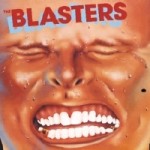
JM: You’re sharing the bill with The Blasters, who you’ve known forever. What are some of your memories of those guys from back in the day?
DJB: Gosh, drinking lots of Budweiser, hanging out. We had a good time. We played a lot of shows together, and they’re just buds. Dave Alvin isn’t playing with The Blasters now. He does on occasion. But there’s Phil Alvin.
I always loved that Johnny Bazz still has a bottle opener on his bass guitar. That says it all [laughs]. And Bill Bateman’s always been a good friend. We just talk drum stuff, you know, and hang out. They’re just good friends. I’ve known them forever.
They turned me onto a lot of music. They were into stuff I’d never heard, older blues stuff. Those guys played 78’s. They know a lot about the history of music, so it’s just fun hanging out with those guys.
JM: Still back in the day, what was the good, the bad, and the ugly about the LA punk rock scene back when you guys were getting started?
DJB: You know, it was a wild and crazy scene. It was relatively small and isolated in a way. In a way it was very typical, a lot of young people hanging out, drinking and staying out late and getting wild. But it was an important scene, because as far as we were concerned there wasn’t a place for original bands to play. It seems like everything was controlled by the record companies. It was hard to play clubs.
I think what was great is that this group of people came together with the same idea to play original music. And somehow we made it happen, between people who promoted the shows… The shows used to move around. It seemed like it was almost day-to-day, week-to-week. You weren’t anticipating the show that was three months away, you were anticipating the show that was maybe two days away. A lot of it was word-of-mouth. You’d do the show, and go “What’s happening tomorrow?” “Oh, so-and-so rented a hall, Larchmont Hall.” Or, “They rented this thing and they’re having shows there now.” So you would go to that show, it’d be a lot of the same people, some of the same bands. There was the entrepreneurial spirit to this. People just said, “Let’s make it happen.” In a way it was a built-in audience. A lot of new bands, and crazy youth.
I don’t know if that answers your question, but it was a really important time because I think it led to other things. I think it gave people the idea that they could actually have a band, or they could do something different. There was a lot of variety, and it went off in every direction over the years. It’s hard for me to really say. Somehow I think it was important.
JM: I first heard X when I was in college in Iowa in the late ’80’s. Was there ever a point where you realized, oh my gosh, people in places like Iowa are listening to us? X was very much an L.A. band, but you did reach beyond.
DJB: The thing is, it took a while for some of the bands from that era to be heard, and sometimes they were rarely heard. The Screamers, I don’t think, ever put out a record. I think later they might have. But it was hard to record. Some of the bands put out a single only, they didn’t tour.
I think the advantage we had is that we started touring, right in ’78. We just said, “We’re going to New York.” Like I said, the scene was really isolated, and people didn’t take it seriously, because there was a New York scene, and the English scene, and then everyone proclaimed “Punk is dead”. And you can’t take anyone seriously in L.A., you know. They were hanging out with movie stars, and living in Bel Air or Beverly Hills. That was the attitude. What we did, we jumped in John’s Travelall, and bought a trailer, then it broke down and we rented one, and we drove to New York straight and played CBGB’s. We played that shit hole. Great club, but, you know, we drove all the way and it was like, “This is just some crappy club. The toilets don’t even work.” I think that helped us to get on the map.
After that, we started touring. I think in ’79 we started going to Texas, and going up north. Then eventually we went around the entire country. And at that time there was just starting to be an alternate scene. It was the same thing I was talking about in L.A. You’d go to a city and someone would say, “Hey, this new club is starting.” Bands were starting to tour. It started very slowly. There wasn’t a regular network. It was a network that various scenes were putting together. It was really great in that way, because, I don’t know if it was spontaneous, but it was fulfilling a need. There were a lot of great people who just said, “I’m gonna book a show.” It was at colleges. A DJ would go, “I’m gonna put on a show, because I like this music.” So it was really grassroots.
So to answer your question, we started traveling around, and we got around the country. And we did it pretty consistently. And more and more bands were doing it at the same time.
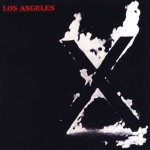
JM: The first X album, Los Angeles, is such a great album. And I should point out that you make the very first sound on that album. You hit the snare drum and it launches into “You’re Phone’s Off the Hook, But You’re Not”.
DJB: I didn’t even think about that [laughs]. It’s good to know that. I was in the vanguard. I was saying, “Come on, guys!”
JM: You set the tone for the whole album with that one snare drum shot [laughs].
DJB: You know, it’s an important snare. I don’t use it anymore, but I was using my Ludwig marching snare. It’s a deep and wide, 15” x 12” marching snare. The history of that snare… I was in a Buddhist marching band when I was thirteen years old or something, fourteen. It was my first new drum. I painted a house, I remember I painted a house to get the $170 to buy it. So, it’s got a history [laughs].
JM: What are your reflections on that album, which is now over thirty years old?
DJB: Well, I think it’s a great album. I really do. It’s one of our best.
What I remember about it is that it came together really quickly. By the time we recorded Los Angeles – I forget if it was recorded at the end of ’79 or the beginning of ’80, it came out in ’80 – we’d been playing the songs a lot. You know, we’d been playing them live, and we had twenty-five songs and we just said, let’s pick the songs that would be great for an album. But we had the luxury of having so many songs to pick for, for the lack of a better word, the perfect album.
In a way it was easy. We just went in and got sounds and played. We didn’t play to a click track. We’d just play a song, we’d play a number of versions, we’d go out there and play five, maybe nine at the most. We just played over and over, and then listen. You know, banal stuff. We played until we got what we thought was the right take, and we went on.
I mean, in the studio you’re kind of in a blur, because you’re focusing. I have some memories of hanging out and talking to Ray Manzarek, or something, in the lobby in between songs. But basically you’re there working very long hours, focusing intensely. That’s the weird thing about reminiscing about an album. It’s basically work. “Tell us the events about sitting around your house writing a novel.” “Well, I sat at the desk and I wrote a bunch. For ten hours a day, then I got drunk and then woke up the next day and did the same thing.” It’s kind of like that. You just focus on it. We had all the experience of playing everything live. We’d been turned down by the majors. Ray Manzarek thought he could get us a deal, and we got all these rejection notices. Slash, which was a magazine at the time and maybe had released one record or a couple of records, said, “Oh, we’ll give you ten thousand dollars and you can put it out.” And Ray said, “Don’t give me a fee, because you need it for the budget. I don’t need it.”
I just remember, we were just ready to go, and it was over before we knew it.
JM: Sadly, Ray passed away not too long ago. How would you characterize what he brought to the equation, to X’s music, the recording process, and so on?
DJB: The brilliant thing that he did is he let us be who we were. He let us be X. He didn’t try to change us, he didn’t try to say, “You know, if you really made the rhythm section sound like this band… This band’s on the radio…” He was enthusiastic about what we were, and I think from his experiences with The Doors he knew that was a unique thing you didn’t mess with. Because you can try to come up with a formula for a band, you know, record companies have done that, people have done that, and sometimes it works. But generally this this strange chemistry happens between people, and they don’t even understand it. And he understood it was a strange band, but there was something unique there. So he let that be.
He basically just let us play. You know, he made certain suggestions. I remember one specific thing. At the beginning of “Los Angeles” he said, play that lick a second time. Because it’s a great lick. We used to go “Dum dum dum dum duh”, and he said, “Repeat that.” So that was one specific thing that we actually changed the structure of the song. But he just encouraged us. “You’ve got something happening that’s special, and let’s get it down on tape.” It was just the most brilliant thing – do nothing.
JM: A little over a year ago Exene announced that she has MS. I’m curious, how is she doing?
DJB: She seems to be doing fine. You know, she sees doctors. She seems like she was really healthy on this last tour we did, opening for Blondie. So, yeah, she seems like she’s doing OK. It’s one of those weird things that you don’t know what the outcome is. It could be in remission, where there aren’t a lot of symptoms for a while. So it seems like she’s doing fine.
JM: That’s good to hear. What are you plans for the near future, either musical or otherwise? I know you just got off the tour with The World Takes. What other stuff is on the agenda?
DJB: X doesn’t play year-round. We usually do about 60 shows a year. Which is funny – some people say, “Oh, you’re back together.” I mean, we play quite a bit considering we’ve been together so long. I think we’ll figure it out. We’re doing the December tour, about twelve or thirteen shows. We’re playing New Year’s in Dallas. Actually we’ve got a couple shows in January, too. We’re doing a 50th anniversary of The Whisky, and we’re playing a show in San Diego. We have some ideas, but there’s nothing totally concrete yet. So we’ll take it year by year.
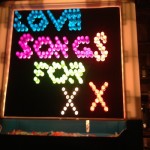
For me personally, I play in a lot of different bands. The World Takes, you heard that band. We just got off a tour opening for The Meat Puppets, and we might do some more stuff next year. We’re talking about that.
And then I play in a band called The Stripminers. We’re mixing our third album. That’s a band with Paul Stinson and Brett Anderson, who’s in The Donnas, and some other great players.
And then I think I’m going to be playing in The Devil’s Brigade – it’s with Matt Freeman from Rancid. I’ve recorded a record with him about three years ago. We’re going to do some shows. So that’s is gonna happen.
I don’t know, I play with a lot of guys [laughs]. I play with some great bands. Ron Franklin is a guitar player from Memphis – I play with him. He’s got a band called Gasoline Silver. And then I’ve been recording with this guy Dan Sartain, doing stuff online. Then I’ve got a band called Frictional. It’s an instrumental band with a couple of great players. Mike Hoffman and Doug Lunn, both veterans. We try to play around more, just having fun with that. And then I play with a band called Falling Moon. I just recorded with Jan King. I’m trying to think of all these people.
I’ve been doing a Morphine tribute. My friend Mark Governor, who’s a producer, is in charge of doing a Mark Sandman / Morphine tribute, so I played on a couple tracks. Then Orchestra Superstring, I played on that. We had Peter Case singing [laughs]. I’m sorry, I’m going on and on [laughs]. There’s a record that should be coming out. They might be trying to finance it. This band I play with called Dead Rock West. They did a tribute to The Everly Brothers. It’s funny, this was recorded three years ago, and I think Billy Joe Armstrong came out with one just recently.
JM: Yeah, with Norah Jones. I haven’t heard it yet, but it sounds… intruiging, I guess.
DJB: I heard one of the tracks, and it sounded really good. They sounded great. But the Dead Rock West one is fantastic, too. You know, we had Elliot Easton playing guitar, and Dave Alvin. Cindy Wasserman, the singer, Frank Lee Drennen, and Cindy’s brother Ron Wasserman played some bass, along with the regular bass player Dave Carpenter. Stuff like that. That’s what I’m going to be doing.
JM: Is that it? It seems like you must have all kinds of free time. You’re just sitting around doing nothing.
DJB: You know, I do a lot of things. Sometimes I juggle things. And this doesn’t even count doing the weddings and all sorts of things, playing with Ray Campi and Rip Masters, rockabilly guys. ‘Cause I’m a freelancer. X plays so many shows, and then I freelance. There’s also the Bonebrake Syncopators, my jazz band. Then I have a band that plays sometimes called the Avalon Quartet, that plays Benny Goodman stuff. I play vibes on that, like Lionel Hampton. So that’s a challenge. Every once in a while I have to dust off my vibes and try to remember how to play.
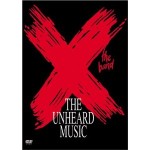
JM: I don’t remember… In the documentary The Unheard Music, were you playing vibes in that?
DJB: Actually, that was marimba. I took marimba lessons just out of high school, because I was playing orchestral music. For a while I thought maybe that’s what I’ll do. So I took lessons, and then I gave it up to play rock and roll. But it resurfaced every once in a while with X and The Flesheaters. They said, “Oh, you’ve got a marimba?” And I had vibes, too. “You want to play in the band?” So then I really kind of gave it up for a while, then in the early ’90’s I started taking lessons again. And then in the mid 90’s I started trying to play jazz. I do it for fun. I’m not God’s gift to jazz playing, but I have a good time, and for me it’s an outlet. It’s a way to understand music and to have fun. I have moments when I’m pretty good, and I have moments when I wonder what the hell I’m doing [laughs]. Why I even play the instrument. But it’s a lot of fun.
JM: Do you want to set the record straight on anything about X or your career?
DJB: You know, I’ll try to think. But it’s funny. I like it when people get things wrong, because I just figure when you’re a public figure, and I’m not the most public figure but I’m in the spotlight, I figure they won’t understand you anyway. I mean, they get little fragments, they see you onstage. They read about you.
OK, here it is. They think we’re partying all the time. That’s it. Because when you’re on the road you have that appearance. You get offstage, you drink a beer. And they think you go home and you’re partying all the time. But you can’t survive when you do that. You know, I’m probably just a pretty boring person. When I don’t have gigs for a week I go out to the garage, I sit down and I practice on a rubber practice pad for a number of hours. And then I take a break, and I practice out of some drum books, and then, you know, I maybe take a jog.
I always talk about myself as a shoe repairman. I don’t know if that’s a good analogy or not, but to me it somehow works. As a musician you sit down and you work on things. You just kind of fix the sole of a shoe. You do that day by day. Then there’s a spotlight on you for some reason. Why do they want to put a spotlight on the shoe repairman? But to me it feels like that, because that’s the stuff you do to get to where you are. That’s the work you do.
I shouldn’t say this, because that’s the fantasy, that you’re always partying.
JM: I think that the people that did that aren’t with us anymore.
DJB: That’s exactly it. I didn’t know that at first. At first it was like a party all the time, and then you realize that you can’t function. You’re on the road, and after a week of doing that you can hardly get out of bed. So, yeah, I certainly saw enough people who did self-destruct. After you start seeing them start falling down by the wayside, eventually you learn. Hopefully.
JM: Where are speaking to me from?
DJB: I’m at home in L.A. I was on the road for three weeks with The World Takes, in an RV.
JM: Let’s elevate you to “a legendary punk rock drummer”. What does a legendary punk rock drummer do for Thanksgiving?

DJB: I’m going to my brother’s house. He lives in L.A., too. My brother is the Music Librarian at the L.A. Philharmonic. How’s that for contrast? He’s been there for twenty-five years or so. So I go to his house with some other old friends. It’s going to be a shorter one this year because I have to drive to Phoenix to play the next day. So I have to get up at 5:00 in the morning and get everything together and drive up there. But it should be fun. My brother, yeah, it’s always good to see him.
JM: What advice would you give to an aspiring musician?
DJB: Oh… [laughs] Well, I would give a couple of answers. One is the cynical answer – don’t do it.
JM: John Doe said that also.
DJB: I’ve had drum teachers who told me that. I had this famous teacher, Murray Spivack, who taught everyone in L.A., and he goes, “It’s the worst business in the world. You shouldn’t get into it. The only good job is a symphony job because you’ll get benefits and you’ll have security.”
But I know that’s not going to stop anyone. I have a daughter, she’s nineteen now, and she’s had friends who want to be rock stars. I give them the reality, and they don’t listen. OK, so if you’re at that point, where you’re not going to listen to anyone who tells you not to get into it, then I guess the best advice is to not get discouraged. Really work hard, if you’re going to work on an instrument. It’s easy to get discouraged, but just be obsessed.
Another thing is to network. You think someone’s going to just take care of you. You’re going to reach a certain point, and everything’s going to be taken care of, and you don’t have to worry about a thing. Going back to my daughter’s friend. “I can’t wait until I get to the point where all I do is play music, and I’m a big star.” And I said, look, if you’re lucky enough to get to that point, you’re going to be dealing with so many things that don’t have to do with music, like business, doing interviews, organizing things, traveling, you know? It’s not what you think it is. It’s good stuff, you just have to learn how to do it.
So, yeah, networking, work on your craft, and remember you’re an entrepreneur, because nobody’s going to do it for you. Even if you’re on a major label, you have to make things happen. I’ve learned that as a sideman. Especially when the economy started to tank. There isn’t anyone who’s going to save you, there’s no one that’s just going to offer you a gig. You have to get together with other people, either organize something yourself or with other people, and make something happen. So that’s all the advice I can give.
It’s a tough business. I’m one of the lucky ones. I never made it rich, but I’ve made a living. I know I can’t retire, but it keeps me on my toes. People are envious of what I do, and I’m thankful for what I’ve had.
Tell those kids [who might be reading this], they just have to be stupid. They just have to be stubborn and stupid. And they’ll probably do OK.
JM: If I recall correctly, John [Doe] said the same thing.
DJB: I stole it from him. Steal things from the greats [laughs].
JM: That’s another good bit of advice…

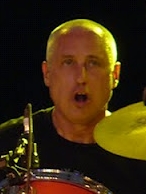
Discussion
No comments for “Interview: DJ Bonebrake”